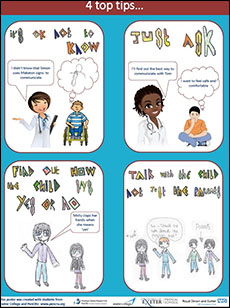
View the poster created with students from Exeter College and PenCRU
Hospital Communications
Would a parent-delivered programme of training for paediatric ward staff improve the effectiveness of communication with disabled children and their parents in hospitals?
Hospital admissions in children with neurodisability are common and it is therefore crucial that communication between staff and families is clear. Communication is particularly an issue for children with a learning disability or those who find social interaction difficult.
This study involved parents, clinicians and researchers co-developing and piloting a training package for health professionals to improve communication with children in hospital.
We reviewed existing research about factors affecting disabled children’s experience of being in hospital. The findings suggest that communication plays a critical role.
We completed a qualitative study with parents of children that had recently stayed in hospital, and with staff working on children’s wards. The findings identified barriers to effective communication, and also facilitating factors likely to improve communication.
We used the information from the review and qualitative study to develop training for health professionals. Parents from our Family Faculty were closely involved in the design and delivery of the training package. We worked with young people with learning disability at Exeter College to create a Hospital Communications poster working on children’s wards to improve communication with disabled children.
The training has been delivered on four occasions at the Royal Devon & Exeter Hospital, and refined each time based on feedback and reflections. We have produced a manual and a film to deliver the training. The film contains video clips of 3 parents’ experiences when their child has been in hospital. These videos are used to prompt reflection and discussion in the training.
In the latest study we assessed feasibility of staff in other hospitals implementing the training using our package materials. Training sessions were delivered in paediatric wards across four hospitals in England, with 123 staff taking part. Facilitators found the training easy to deliver, and participants felt they took away important messages to improve their practice.
In a new development our nursing students in Exeter provided positive feedback when it was delivered to them online. This low-cost, minimal-resource training package is now available free of charge to support staff training in communication with disabled children and their families in hospitals.
This research has been supported by NIHR PenARC and a grant from the Royal Devon and Exeter NHS Foundation Trust.
For more information, please get in touch.
Outputs
Wilkinson, K, Gumm, R, Hambly, H, Logan, S, Morris, C. Implementation of training to improve communication with disabled children on the ward: A feasibility study. Health Expect. 2021: 1– 10.
, Hambly, H, Tomlinson R, Logan S. and Morris C (2017), Improving communication between staff and disabled children in hospital wards: testing the feasibility of a training intervention developed through intervention mapping.
Sharkey, S., Lloyd, C., Tomlinson, R., Thomas, E., Martin, A., Logan, S. and Morris, C. (2016), Communicating with disabled children when inpatients: barriers and facilitators identified by parents and professionals in a qualitative study. Health Expect, 19: 738–750. doi:10.1111/hex.12254
Shilling V, Edwards V, Rogers M. and Morris C. (2012), The experience of disabled children as inpatients: a structured review and synthesis of qualitative studies reporting the views of children, parents and professionals. Child: Care, Health and Development, 38: 778–788. doi:10.1111/j.1365-2214.2012.01372.x
NIHR PenCLAHRC has featured findings from PenCRU’s research aiming to improve communication with disabled children when they have to stay in hospital in a bite-sized summary.
We have also produced plain language summaries for each paper.

